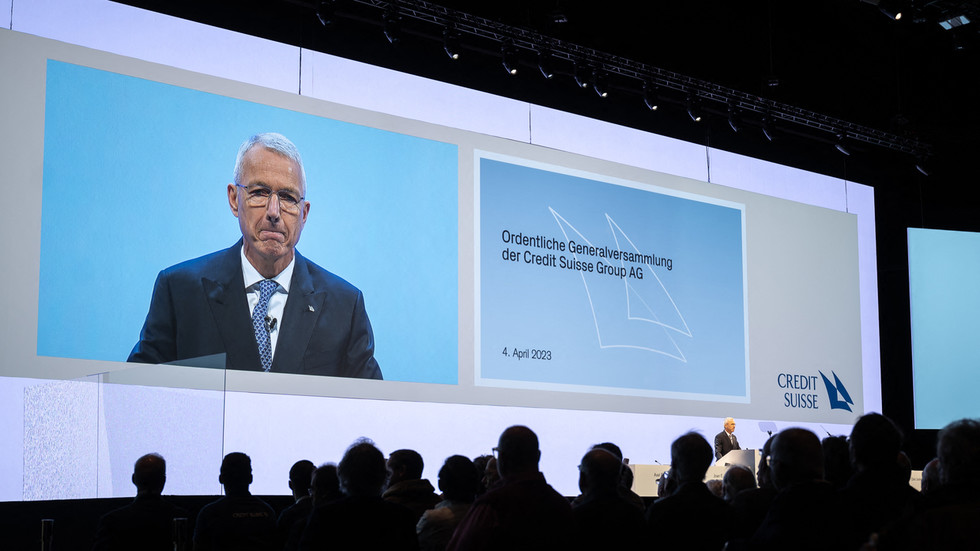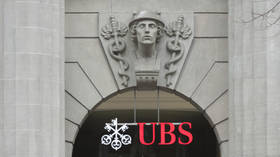
The boss of Credit Suisse has said he is ‘truly sorry’ about the collapse of the 167-year-old firm

© AFP / FABRICE COFFRINI / AFP
Credit Suisse Chairman Axel Lehmann apologized to shareholders on Tuesday for failing to contain the crisis which led to the lender’s downfall. The ailing Swiss banking giant was taken over by rival UBS last month.
In an emotional speech at Credit Suisse’s last annual general meeting, Lehmann said he had run out of time to turn the bank around, despite his belief “until the beginning of the fateful week” that it could survive.
“It is a sad day. For all of you, and us. The bitterness, anger, and shock of all those who are disappointed, overwhelmed, and affected by the developments of the past few weeks are palpable,” he said.
Lehmann, who has been chairman for a year, added: “We wanted to put all our energy and our efforts into turning the situation around and putting the bank back on track. It pains me that we didn’t have the time to do so and that in that fateful week in March, our plans were disrupted. For that, I am truly sorry. I apologize that we were no longer able to stem the loss of trust that had accumulated over the years and for disappointing you.”
The meeting was the first time that Lehmann and Chief Executive Ulrich Koerner publicly addressed shareholders since the takeover.
The hastily arranged merger, for which Swiss authorities invoked emergency legislation, was met with a backlash as it had bypassed Credit Suisse shareholders, who would otherwise have had voting rights.

Read more
“The government’s use of emergency powers to push this deal through goes beyond legal and democratic norms,” Dominik Gross of the Swiss Alliance of Development Organizations told Reuters.
“Swiss taxpayers too are on the hook for billions of francs of junk investments and yet the government, (regulator) FINMA and the central bank have given little explanation about the state’s 9 billion (franc) loss guarantee to UBS,” he said.
Meanwhile, Norway’s sovereign wealth fund – one of the world’s largest investors – has stated it will vote against the re-election of Lehmann and six other directors, in a public show of protest.
Shareholder advisory firm Ethos denounced the “greed and incompetence” of the bank’s managers, as well as pay that reached “unimaginable heights.”
“Shareholders have lost considerable amounts of money and thousands of jobs are on the line,” it stressed.
Credit Suisse’s compensation report shows that Lehmann, who has been the Swiss bank’s chairman since last January, forwent a chair fee of 1.5 million Swiss francs ($1.6 million) that is usually paid on top of board members’ salaries.
According to the report, he has also proposed taking lower pay for 2023-2024, at 3.8 million francs ($4.1 million), down from the expected 4.5 million francs (almost $5 million). Lehmann’s salary for 2022-2023 is reportedly 3 million francs ($3.2 million).
Credit Suisse is also planning to raise the percentage of Lehmann’s salary paid in shares, from the current 33% to 50%.

Read more
In a historic merger announced last month, UBS agreed to pay 3 billion Swiss francs ($3.24 billion) in stock to acquire its embattled rival. The deal was underpinned by government guarantees and 100 billion francs ($109 billion) in liquidity assistance from Switzerland’s central bank. The government-brokered agreement was aimed at shoring up public confidence in the Western financial system and averting a global crisis after the collapses of two regional banks in the US.
The crisis exacerbated the troubles of Credit Suisse, which had been already battling a string of scandals, legal issues, and customer outflows. In addition, its biggest investor, Saudi National Bank, announced in March that it would not be able to provide financial assistance due to regulatory and statutory limits.
Credit Suisse reported a 2022 net loss of 7.3 billion francs (nearly $8 billion) and warned that it would incur another “substantial” loss in 2023 before returning to profitability in 2024.
Credit Suisse was founded 167 years ago by Alfred Escher, a Swiss magnate who helped build the country’s railways.
For more stories on economy & finance visit RT’s business section




